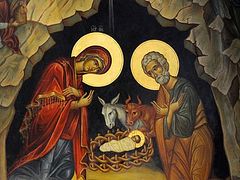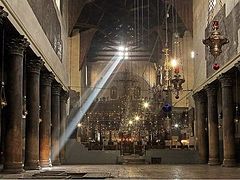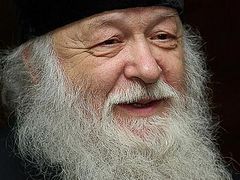During these days we are celebrating the feast of feasts—the Nativity of our Lord Jesus Christ. The Nativity is one of the greatest feasts of our Church, for in it we celebrate a truly great event, wherein God Himself became Man in order to deify us and lead us up to Himself. The hymns of the Nativity tell us of an incomprehensible miracle, about how God became Man, about the Holy Theotokos, who was worthy enough to incarnate God the Word, and about man, called to become godlike by means of grace. They tell us also of the magi, the shepherds, and the angels who sang, “Glory to God in the highest, and on earth peace…” (Lk 2:14). All of the Scripture readings and troparions are dedicated to this great feast. However, the underlying question is: How can we, as Orthodox Christians, experience these feast days? And what do they mean to us?
Church feast days are these sorts of “stops” that we have for our spiritual renewal. When one travels by foot, he must make stops at some points, rest a bit, restore his energy, and then be off on his way again. It is the same with Church feast days, especially feasts dedicated to the Lord and the Theotokos—they are like these stops that we who labor and are heavy laden, who carry the cross of everyday hardships, must take. The main purpose of these feasts is for one to receive God’s grace, which is abundantly given during these days. Even the holiday atmosphere on the streets, if we view it from a Christian standpoint—everything shows sign of preparation for the coming of our Lord Jesus Christ. Though of course, the meaning of the Nativity must not be limited to only external celebration and traditions.
“Now all creation is filled with joy, for Christ is born from a Virgin.” This means everything: heaven, Earth and all beings—both noetic and visible. All are called to take part and celebrate the coming of our Lord into the world.
It is said that in Bethlehem, in the very cave where Christ was born, there lived and spiritually labored a saint by the name of Jerome. On the Eve of Nativity he did not sleep; he prayed, and by the grace of God, experiencing in his heart the events of the Nativity, said to Christ: “My Christ, everyone has brought you something on this day. The Magi brought gifts, the Angels have sung hymns, the shepherds worshiped You, the earth has given You a cave, and mankind has given You the Holy Theotokos. But what can I give to You on this day? All I have is Yours, for you gave me everything.” Praying in such manner, the saint, by the grace of the Holy Spirit, saw the Lord as a Babe in a manger Who then answered him: “Jerome, I only want one gift from you”. Jerome came to a state of trepidation, awaiting what gift the Lord would ask of him, and enquired: “What gift do You want, O Lord?” And Christ answered him: “I want you to give me your sins”. In other words, “I want to lift up the heavy burden of your sins.”
The meaning of this feast day for us, who are constrained by the passions and sin, lies in the obtainment of freedom, which the Lord has given us through His birth; to be freed from slavery to sin and the darkness of our falling away from God, and also to again be able to experience rejoicing in life as true children of God; to perceive God as our Father and understand how valuable we are—not because we in and of ourselves are something special, but because we are children of God; and that because of us, and for each and every one of us, God became Man.
The mystery of the Nativity could not even be understood by the angels. “Lord… Thy bodiless Angels knew not how Thou becamest incarnate”. This is a great, incomprehensible mystery. How can the mind of man, a temporal and created thing, comprehend what the Lord did through His boundless and divine love? These are things that one can only understand with his heart; they are inexplicable through logical reasoning.
The fall of man ruined our communion with God and surrendered us over to death. The birth of God the Word renews all creation and renews one to eternal life. This feast marks the beginning of our salvation, which is why we sing, “Thou art come, Thou art made manifest, the Light that no man can approach.” We now see Christ and no longer await him or read prophecies about Him coming one day. He has already come, the unapproachable Light has appeared. “Our Savior, the dayspring from the east, has visited us from on high, and we who were in darkness and shadow have found the truth, for the Lord is born of a Virgin.” For us this is now something that we have obtained; we have found the truth and no longer seek it. In the Church we are not those who seek the truth, for the truth is Christ and not something philosophical. And the same is to be said about the peace of which the Angels sang, the essence of which is not in the absence of war, but in the presence of Christ in the world. When Christ became man, the peace of God came down upon Earth.
What Christ wants to receive from us on the day of His Nativity is our sins. In other words, He wants us, sinful ones, to ask Him to come into our unclean hearts and to be born there as He was born in likewise fashion in an unclean manger of irrational beasts. Then, heaven will dwell in our heart, our “manger” will be transformed into Paradise, and we will live with Christ; and in the presence of God the Father we will experience joy in our humble hearts.
The Church is like a bridal chamber; it is the place where the union between God and man takes place. In the Church God became Man, The Word was made flesh, and dwelt among us, and we beheld his glory, the glory as of the only begotten of the Father… (John. 1:14). We have seen God the Word, we have received Him, we have entered into communion with Him, experienced Him, and continue to unite with Him.
From: Metropolitan Athanasios of Limassol, The Open Heart of the Church (Moscow: Sretensky Monastery, 2014) (Russian).




